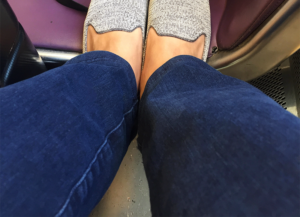 Michele wants to reach financial independence (FI), and her grandparents are leaving her their house. She already owns a home, and she’s torn between six potential options that will propel her toward FI. What should she do?
Michele wants to reach financial independence (FI), and her grandparents are leaving her their house. She already owns a home, and she’s torn between six potential options that will propel her toward FI. What should she do?
Fred doesn’t have access to a workplace retirement plan. Besides opening a Roth IRA, what else can Fred do to juice up his retirement savings?
Pauly from Portland doubled the inheritance money he received from $50,000 to $100,000 during the pandemic. Now he’s wondering if it’s okay to use this $100,000 as a downpayment on a home in Portland. Is that a wise use of the money?
Preethi accidentally withdrew funds from her Roth IRA as an excess distribution, and she’s already filed her taxes. What should she know for tax time next year?
Casey is in the market for a second rental property and wants to know: would we recommend purchasing a rental in a complex where she already owns a condo? Or should she diversify into a different complex in a different, nearby, more stable town?
My friend and former financial planner, Joe Saul-Sehy, joins me to answer these questions on today’s show. Enjoy!
Michele asks (at 2:49 minutes):
At 29, I’m first-generation from my family to graduate college, and I want to be the first to reach financial independence, too. My grandparents are 90 and aren’t in the best health. I stand to inherit their home – worth $200,000 and fully paid off – in the next few years. I want to be prepared when that happens.
I make around $40,000 per year at a state job that I enjoy. I’ll probably work there for another 25 years – at 54, I’ll be eligible for a full pension, at which point I’d like to be financially free and have the option to work.
I have $2,000 in savings and I invest 30 percent of my income in a Roth 401k and a Roth IRA. My employer only matches $50 because of the pension, and I have $12,000 between the Roth 401k and IRA.
I also have a $95,000, 15-year mortgage on my primary residence, which is worth around $125,000. I have no other debt, and I also make $500 – $1,200 per month in a waitress job on the side. I’m not married and I don’t have kids.
There are six options that I’m considering:
- Sell my house, move into my grandparents house, and live rent-free. Ideally, I’d take the $800 I was paying on my mortgage and put it into my retirement accounts instead.
- Rent out my current house, move into their house, and net around $1,100 per month in rent. I’m not sure I’m brave enough to be a landlord, though.
- Move into their house and pull equity out of it for…something – probably not rental houses.
- Sell both houses, use a portion of the sale as a downpayment on a new house, and invest the rest. I’m not sure where I’d invest it, though. I follow The Simple Path to Wealth framework and all of my retirement accounts are in VTSAX. I’ve never invested in a taxable account.
- Live off of the money from the sale of the house and invest my entire paycheck in my Roth 401k. I’ve heard this can be a good strategy.
- Put all of the money in a taxable account and let it grow over the next 20 years, following the belief that time in the market beats timing the market.
Can you give me any direction?
Fred asks (at 28:54 minutes):
I’ve worked in small nonprofits my entire adult life, and we don’t typically have access to 401k’s or other tax-advantaged retirement accounts. I opened a Roth IRA, but I know I need something else to maximize my retirement savings. If I can’t get an employer-sponsored plan, what are some other ways I can save for retirement?
Pauly from Portland asks (at 37:47 minutes):
Two years ago, I received a $50,000 inheritance. I held onto the cash because I wasn’t sure what to do with it – until the pandemic hit. As the market dropped, I poured the money into a taxable brokerage account, and the result is a balance of $100,000.
During the pandemic, I realized that I want to own my own home in Portland. I see myself living here for the rest of my life. However, over the last decade, housing prices have steadily increased here. I suspect that prices will continue to increase in the future; Portland will probably be a destination city to move to as we see climate change make other cities too difficult to live in. I know that’s cynical, but psychologically, I think Portland is a great place to stay long-term, and given that, it also makes sense to lock in a housing price sooner than later.
I’m looking to buy in the next one to three years. I could take the $100,000 out of my taxable brokerage account and use it as a 20 percent downpayment, but I know you recommended against using the stock market for short-term goals. However, if I don’t tap into this money, I’ll have to save for another four to six years for a downpayment – possibly more, if housing prices continue to rise.
Is tapping into the brokerage account for my downpayment wise? Is there something I’m overlooking?
Preethi asks (at 53:16 minutes):
I accidentally withdrew funds from my Roth IRA as an excess distribution this year, but I’ve already filed my taxes for 2020. I’ll probably have to deal with this next year, and I want to know what the consequences might be.
I’m 32 years old and I opened this Roth less than five years ago. My income disqualifies me from making Roth contributions for 2021, and I funded my Roth through a backdoor contribution for 2020. Any advice?
Casey asks (at 1:00:58 minutes):
I bought a condo for $140,000 in Alexandria, VA a few years ago. I’ve since turned it into a rental. A year after buying it, Amazon announced that they would build their headquarters two miles down the road. Comparable condos now sell for $180,000.
I suspect that within the next five or 10 years, my complex (which was built in the 1950s) will get bought out for redevelopment. Ten years ago, an empty lot on one side was used to build a new condo building. A much larger complex, around the same age and directly in front, is undergoing a redevelopment. The owners got buyouts and it’s being torn down to build high-end, mixed-use buildings.
I’m in the market to buy a second condo that I’d like to use as a rental. Does it make sense to purchase within the same complex since it’s easy and inexpensive, or should I look elsewhere to diversify?
My parents live in Vienna, VA, where they’ve owned a condo for over 10 years. It’s a very wealthy suburb a bit farther from the city. I could buy a condo in their building for about $250,000. The condo fees are the same, but there’s less crime, it’s more stable, and it’s a fancier neighborhood.
For additional context, my monthly mortgage payments are roughly $1,300, and the tenant pays $1,550 per month.
Where should I buy?
Resources Mentioned:
- Blueprint Income | Annuity Company
- The Art of Decision-Making, with Annie Duke | Interview
Thanks to our sponsors!
Radius Bank
Want to earn cashback with a debit card? Then check out Rewards Checking from Radius Bank. You automatically earn 1 percent cash back with every purchase made, and you can earn 1.5 percent cash back on select categories. Their customer service is available seven days a week. To get started, head over to radiusbank.com/paula and enter code ‘paula’ for a $50 sign-on bonus.
Mint Mobile
Saving money on your phone bill is easy with Mint Mobile – they have plans starting as low as $15 per month, and all plans come with unlimited talk and text and high-speed data delivered on the largest 5G network. To get a new wireless plan for $15/month shipped to your door for free, go to mintmobile.com/paula.
Public
Public.com is creating a new, more inclusive culture for investing. You can start investing today with as little as $1. You’ll even get a free slice of stock when you join. Go to public.com/affordanything to download the Public app. You can follow me and see what I’m investing in, too.

My Betabrand pants are so comfortable!
Betabrand
It’s nice to feel comfortable and put together, especially when working from home. Betabrand has many different styles of dress pant yoga pants, and they’re as awesome as they sound. Check out betabrand.com/paula and get 30% off one pair.